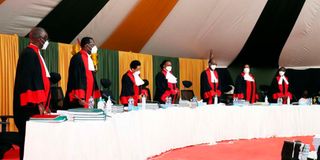Kenya awaits BBI ruling with bated breath

The Supreme Court is set to render its much-awaited decision on the Constitutional Amendment Bill (2020) - the Building Bridges Initiative (BBI), marking the end of close to two years of a legal battle between the government and a group of citizens opposed to changes to the Constitution.
Apart from anticipations that the judgment scheduled for Thursday morning will shake up the country’s political landscape and governance system, the top court’s decision is also likely to sway the outcome of the forthcoming General Election.
Since the two leading protagonists in the August presidential election, Dr William Ruto and Mr Raila Odinga, hold opposing positions on the BBI Bill, it means the Supreme Court’s judgment will be a victory or a loss to one of them.
It will boost President Uhuru Kenyatta’s aspiration of bringing to an end the “winner takes all” ethnic politics and expansion of the Executive, or bury the aspirations altogether.
The judgment could see the return of a hybrid architecture of government with leader of official opposition seat in the National Assembly and a prime minister with two deputies.
Should the top court allow the BBI process and the proposed amendments to sail through in the next stages of legislation, the war against corruption will receive a boost as one of the proposals is banning of public officers from doing business with the government.
Members of Parliament will also be increased, because the Bill proposes creation of 70 additional parliamentary constituencies.
The 45-page Bill contained 74 amendment articles, which experts said affected the entirety of the Constitution.
Local and international legal experts are also looking forward to the findings of the Supreme Court given that some of the people who participated in seeking a solution to the dispute are top world constitutional experts.
One of the top scholars was Richard Albert, professor of World Constitutions and director of Constitutional Studies, at the University of Texas at Austin.
The seven-judge bench led by Chief Justice Martha Koome retreated on January 20 to assess the declarations by the High Court and Court of Appeal that the BBI is unconstitutional.
Besides declaring it illegal, the Court of Appeal had also held that the proposed changes were not amendments as understood, but a dismemberment of the Constitution.
The other judges in the Supreme Court bench are Deputy Chief Justice Philomena Mwilu and justices Mohammed Ibrahim, Smokin Wanjala, Njoki Ndung’u, Isaac Lenaola and William Ouko.
Among the issues that Kenyans will be observing is whether the judges will deliver a unanimous judgment or they will each write his/her own judgment like it happened at the Court of Appeal.
Pundits argue that multiple judges delivering a single judgment, unanimous or not, denies people benefit of getting the intelligence resource possessed by the judges.
Being multiple judges tasked to decide the BBI case, there is likelihood of a disagreement on the outcome of the case considering that it involves various issues and at least seven questions.
In such circumstances there will be two or more decisions -a majority decision, dissenting or concurring decisions. Majority decision becomes the ruling of the court.
Unlike at the Court of Appeal where there was regular bar-bench engagements during the oral hearing, there was minimal interaction between the judges and advocates at the Supreme Court.
The Supreme Court did not ask the lawyers any questions while they were making their oral arguments.
Instead, the judges took turns in asking a series of questions and clarifications after each side (Pro-BBI and anti-BBI) finished their respective presentations.
While rendering its judgment, all eyes will be on Justices Mwilu and Ibrahim. The two did not ask any question or seek clarification from the parties during the oral hearing.
Lawyers from each side were granted three minutes to respond to the questions. The court was not flexible on time management.
Eight of the constitutional experts admitted as amicii (friends of the court) at the Supreme Court were denied audience.
The court’s decision to block them denied Kenyans an opportunity to learn what was their take and what questions would have been asked to them by the judges as they were denied them opportunity to orally highlight their arguments.
It also did not go unnoticed that advocates were discontented with the time allocated by the court to orally highlight their arguments and answer questions raised by the judges in relation to the BBI.
The immediate former president of the Law Society of Kenya (LSK) Nelson Havi and veteran lawyer, Dr John Khaminwa, were unable to hide their discontentment about the restriction of time.
While remarking that time was not of essence in the case, Mr Havi asked: "The Supreme Court sits once after five years. What is the hurry, where are we going to?"
The judgment of the Supreme Court will also affect the Judiciary because one of the many proposals contained in the Constitutional Amendment Bill (2020) –BBI- is a recommendation regarding creation of the Judiciary Ombudsman to be appointed by the President.
The proposed ombudsman will have powers to discipline Judiciary officials, including suspending, warning and reprimanding them.
Another proposal concerning the Judiciary is enhancement of the number of executive appointees in the JSC from four to five.
The Judiciary had earlier protested against the proposal saying “the unusually heavy tilt towards Executive representation in the JSC compared to other commissions has the potential danger of entrenching Executive authority in the JSC and by extension, in the Judiciary”.





